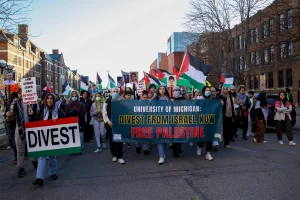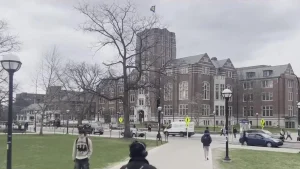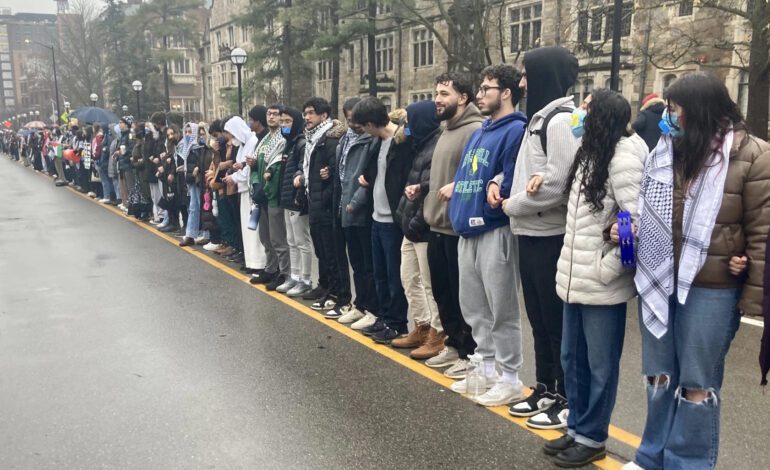ANN ARBOR — The Michigan chapter of the Council on American-Islamic Relations (CAIR-MI) is demanding an independent and transparent investigation into allegations that the University of Michigan deployed undercover investigators to surveillance, intimidate, and harass pro-Palestinian students on campus.
“U of M Ann Arbor being exposed for undercover surveillance solidifies our position that there is systemic discrimination against students advocating for Palestinian rights and against genocide,” said CAIR-MI Executive Director Dawud Walid.
“The university only canceled the services they were employing because they were publicly exposed,” Walid added. “However, that step does not rectify how student organizations, such as SAFE and SJP, have been mistreated, or the broader stifling of free speech on campus.”
The call for accountability follows a Guardian investigation revealing that operatives hired by the university followed, recorded and in some cases threatened students involved in Palestine solidarity work. Several U of M students are now speaking out publicly, describing a campus climate shaped by fear, suppression and intensified resistance.
On Monday, interim President Domenico Grasso moved swiftly to cancel all university contracts with private security firms, just two days after the Guardian published a damning exposé revealing widespread harassment and abuse by a private security company targeting pro-Palestine student activists — ranging from surveillance and verbal abuse to physical threats, including an alleged attempted vehicular assault.
Documents obtained by the Guardian showed that the university’s contract with City Shield began much earlier. The university paid the firm $800,000 for its services between June 2023 and September 2024, and the report suggested additional payments may have been made for the deployment of undercover agents to monitor students both on and off campus.
“The intent of these personnel was to help us monitor our campus and respond quickly to emergencies,” Grasso said. “No one should ever be targeted because of their beliefs or affiliations.
“We recently learned that an employee of one of our contracted security firms behaved in ways inconsistent with our values and guidance,” he added. “What happened was disturbing, unacceptable and unethical — and we will not tolerate it.”
He concluded by saying the university will terminate all contracts with private firms providing plainclothes campus security going forward.
Grasso also urged anyone who observes or experiences misconduct by a university employee or contractor to contact campus police or the university’s equity and civil rights offices.
Allegations of harassment
Multiple students reported being followed, cursed at, and even physically endangered by undercover agents. Videos and first-hand accounts appear to corroborate several of the incidents, including a video shared by Josiah Walker, a U of M student who was followed and filmed.
“I noticed the same people and vehicles showing up wherever I went — on and off campus,” Walker said. “When I’d catch them, they’d often resort to drastically escalating their aggression.”
Walker’s experience, which has circulated widely online, involved a surveillance operative who, after realizing he had been identified, resorted to what Walker described as “extremely racist, ableist and dangerous tactics.” When approached, the operative pretended to have a disability, and later accused Walker of attempting to rob him.
“This is what the surveillance operatives were willing to do on camera,” Walker said. “There’s no telling what happens when no one’s watching.”
Students described this surveillance as intimidation aimed at silencing opposition to Israel’s genocide in Gaza. Many say it reflects a broader pattern of systemic repression against Palestinian advocacy on campuses across the country.

Students march down E University Ave during the National Walk-out for Gaza, Feb. 8, 2024. – The Michigan Daily
Patterns of repression
This is not the first time CAIR-MI has raised concerns about U of M’s treatment of pro-Palestinian students. Earlier this year, the university suspended the student organization Students Allied for Freedom and Equality (SAFE), and has already been labeled a “university of particular concern” in CAIR’s national Unhostile Campus Campaign for fostering an unsafe environment toward students — particularly Palestinian, Muslim, Arab and Jewish students — who speak out against the genocide.
One U of M student of Southern Lebanese descent, who requested anonymity, described the environment as one of intimidation and psychological pressure.
“It’s an uphill battle. The leadership of SAFE are tied up in legal disputes, and we’re constantly monitored,” he said. “When you know that admin and undercover police are watching your every move, that thought occupies mental space — space that could have been used for advocacy.”
He added that the university’s tactics extend beyond surveillance.
“Police in riot gear, arrests, lawsuits — all of it is meant to intimidate. I’ve had friends followed by police cars, homes broken into, laptops stolen. All these have a chilling effect.”
He also recounted witnessing police pepper-spray protesters and push a student to the ground during a peaceful demonstration in fall 2024. The police had deliberately triggered panic and violence to disperse the crowd.
“Besides the safety concerns, this stuff stings,” the student said. “The protester washing pepper spray out of his eyes will never forget the moment he was assaulted — but the media, the administration and most students move on like it’s nothing. This makes you ask, ‘Is there any hope?’”
Student resistance
Despite the fear and repression, students say the university’s actions have only deepened their commitment to the cause.
“It’s terrifying to know standing up for Palestinian lives can make you a target,” said Aya Moughni, a U of M student and SAFE board member. “But our resistance is rooted in solidarity, and no amount of intimidation will silence that.
“If anything, it’s made me a more committed activist,” she added. “Every act of repression only fuels our determination, because we understand what we’re facing is nothing compared to what Palestinians and Lebanese endure daily.”
For students, resisting surveillance is about more than safety — it’s about visibility and refusing erasure.
“All of this violence and harassment, if you let it take away your voice, you let them win,” Moughni said. “However, no matter how hard they try, they can never take away your voice. Never.”

University of Michigan accused of using undercover investigators to spy on pro-Palestinian students. – File photo
What the moment demands
As advocates look ahead, many say this moment demands more than outrage — it demands action.
“We at CAIR-MI will continue to hold U-M accountable,” Walid said. “It is important that alumni and parents of students contact the university and make their voices heard against the unequal treatment towards Muslim and Arab students on campus.”
Moreover, U of M students call for an end to repression, and urge communities to remain united in support of Palestinian liberation.
“From our institutions, it demands doing what is right — even if that requires fundamental changes,” said one student.
For him, that includes full divestment from Israel and a transparent investigation into how student activism has been policed.
“From the community, what is demanded is never giving up.”
Ultimately, alongside institutional reform, students say lasting change requires individual persistence.
“To anyone afraid to speak up — that’s okay,” Walker said. “Do it while afraid. That’s the definition of courage.”
Student protests calling for divestment from Israel have intensified since Israel launched its brutal assault on Gaza in response to the October 7, 2023, “Al-Aqsa Flood” operation. University administrators, however, have not heeded student demands, instead deploying campus police to clear the central “Diag” encampment and arrest several protesters, though charges were later dropped by Michigan Attorney General Dana Nessel.
The protests at the prestigious Ann Arbor campus are part of a nationwide student movement that began at Columbia University in April 2024 and spread to most major American universities. Many schools called in law enforcement to crack down on demonstrators and dismantle pro-Palestine encampments, resulting in more than 3,100 arrests — mostly of students and faculty.
Some universities also disciplined protesters, including eight former University of Michigan employees who filed a lawsuit last month against the university’s board of regents, president and other officials, claiming they were fired for publicly supporting Palestinian human rights and calling on the university to divest from Israel.
Despite the crackdowns, U.S. universities — including the University of Michigan — are facing mounting pressure from President Trump’s administration, which has reduced funding and launched investigations to pressure institutions to suppress pro-Palestine activism under the banner of combating “anti-Semitism”, intensifying the conflict between academic freedom and political interference.






Leave a Reply